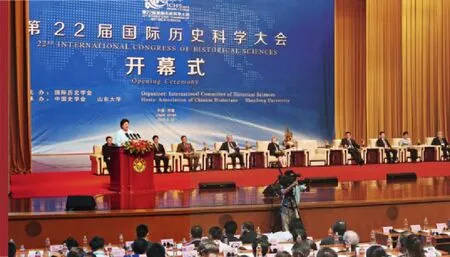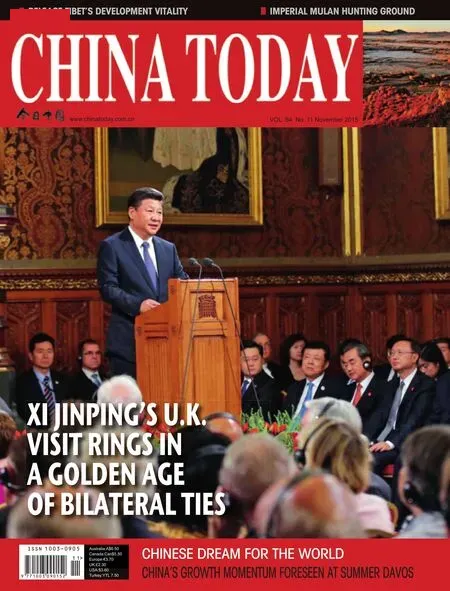History:Our Common Past and Future
By GAO XIN
History:Our Common Past and Future
By GAO XIN
CHINESE President Xi Jinping quoted in his congratulatory letter to the 22nd International Congress of Historical Sciences the ancient maxim “History is made out of changing dynasties and people and the passing of time,” so emphasizing his belief that historical research forms the basis of all social sciences. He added that historical research undertakes the mission of “understanding the relations between natural phenomena and human society and the changes of history.”
《大阅兵》一般被认为是一部匆忙上马之作。就像陈凯歌导演自述:“如果你有兴趣反复看一下《大阅兵》,就可以感觉到几种不同的力量在牵制着陈凯歌,感到他有许多东西想说,可又没说透,因此表现出来的东西挺混乱的。”[3]54
The 22nd International Congress for Historical Sciences,widely known as the “Olympics of Historical Sciences,” took place in Jinan,Shandong Province,from August 23 to 29. More than 2,600 scholars from 90 countries and regions throughout the world participated. This marked the frst time since its inauguration,115 years ago,that the congress was held in Asia. The number of participating countries and regions was also the highest in the history of the event. Professor Robert Frank,secretarygeneral of the International Committee of Historical Sciences,said,“That the congress has come to China signifes Asia's positive role in breaking away from Eurocentrism in historical research to explore new perspectives and thinking.”
“Olympics of Historical Sciences”
When French diplomat Medill raised the suggestion of a general assembly on history at a meeting of foreign diplomats in Geneva,117 years ago,he could never have imagined that his initiative would endure two world wars to become the International Congress of Historical Sciences.
The congress,as an academic community,has undergone profound changes since the Paris Congress of 1900 that reflect the evolution of world history,epistemology,and methodology in global humanistic and social sciences.
The congress also saw the inaugural presentation of the Grand International History Prize of the International Committee of Historical Sciences in recognition of outstanding research,works and teaching in the feld of history,an honor that went to French historian Serge Gruzinski. “Although this prize is relatively small,in terms of importance it could well be regarded as the counterpart to the Nobel Prize and the Fields Medal in math,” Marjatta Hietala said.
President of International Historical Sciences Marjatta Hietala said that the congress,held every five years,opens the door to topics from diverse cultures and that for the global community of historians it is the most signifcant international event.
“The Chinese civilization has a 5,000-year,uninterrupted history. We consequently have numerous outstanding historians,scholars and historical works. However,it took a long time and underwent many twists and turns before we were fnally able to hold the congress in China,” Zhang Haipeng said. “Our dream has fnally been realized. This has much to do with China's economic growth,improved soft power,and of course our increasingly important position in the world. In 2010,China surpassed Japan to become the world's second largest economy. Our international prestige and right of speech have at the same time expanded to an unprecedented degree.”
A main innovation of the congress was that of making “china from a Global Perspective” a major topic.
著名教育家夸美纽斯在其教育著作《大教学论》中指出:应寻求并找出一种教学的方法,使教员因此可以少教,但学生可以多学.“少教多学”的理念在数学教育领域的运用也已取得了较为丰硕的实践成果.数学课堂上,如果教师一直在讲授,学生缺少思考的时间,是不利于其掌握数学知识、提升思维品质的,即“多教”并不一定能“多学”.鉴于此,适当减少数学教师课堂上的讲授,合理运用课堂留白,为学生的自主学习与反思创造了条件,有助于收到“少教多学”的效果.
相比之下,我国农业面源污染及其防控研究较晚、认识较少,但也发展了一些具有区域特色的控制措施[5]。更为重要的是,一些综合化的控制理念或模式相继涌现,如农业面源污染立体化削减体系[7]、生态拦截型沟渠系统[8]、农业立体污染的防治技术体系[9]和农田生态系统管理措施[10]等。

The opening ceremony of the 22nd lnternational Congress of Historical Sciences in Jinan,Shandong Province.
Compared with past sessions,the 22nd Congress paid special attention to support and funding for young scholars. It established a fund earmarked for young scholars in Eastern Europe,and researchers unable to obtain funding from their own universities.
“China Time” in World Historical Sciences
The development of sciences is a mirror of time. “Opportunity and honor have demonstrated our progress and strength,and this congress could stand testament to the trust that world historical circles have in China and the attention they pay to the country,” secretary-general of the Chinese Association of Historians Wang Jianlang said.
“We have waited 110 years since 1905,when a Qing Dynasty scholar published a report about the congress,and it has fnally been successfully held in China,” said president of the Chinese Association of Historians Zhang Haipeng,who has been directly engaged in the application,preparation and hosting of the congress.
The theme of the 22nd International Congress of Historical Sciences was “History: Our Common Past and Future.” As President Marjatta Hietala said,the success of the congress lies in motivating historians from different continents and countries to gather to discuss innovative subjects,new methods and thematic paths,and make comparative studies. The seven-day event included 175 activities,including the four major theme discussions: China from a Global Perspective; Historicizing Emotions;Revolutions in World History: Comparisons and Connections; and Digital Turn in History,and 82 other specialized theme discussions,joint sessions and round tables. Throughout these activities,historians presented their achievements in breaking away from the Eurocentric,West-oriented framework and their endeavors towards globalization and transnationalization of historical research.
A main innovation of the congress was that of making “China from a Global Perspective” a major topic. This signifies the extent of importance that the International Committee of Historical Sciences and the historians of the world attach to China. As Vice Premier Liu Yandong said,“If a global perspective is the space coordinate through which to know China,then a historical perspective is the time coordinate through which to understand it.”Twelve scholars from Italy,France,the U.S. and other countries and regions shared their research achievements during the theme session. They thus focused on China's history and current profound social changes in exploring the historical origins of China's emergence as a global power.
(1)中药标本应具有代表性。由于受采收、加工和贮藏等多种因素影响,并不是每个中药个体均能体现所有的性状特征,因此,在选择中药标本时应挑选具有代表性的样品。
Steeped-in-History Shandong
“We deem it a great honor that the International Congress of Historical Sciences should choose Shandong as its first venue in Asia. This is a wise decision,because historical sciences are the foundation of all social and humane studies,and Shandong is the birthplace of China's historical sciences,”Governor of Shandong Province Guo Shuqing said. Shandong,renowned for its “One Mountain (Tai Mountain),One River (the Yellow River) and One Sage (Confucius),epitomizes Chinese civilization in both natural resources and human development. One of the origins of Chinese civilization,many influential thinkers in Chinese history,including Confucius,Mencius,Sun Zi,Mo Zi,Zhuang Zi and Guan Zi,were either born in Shandong or came here to work and write. These men started the inclusive academic tradition whereby all schools of thought contend. Shandong University,host of this congress,excels in literature and history,and has a long and profound history of culture and learning. “Satellite meetings” took place in six cities respectively in Jinan,Qingdao,Zibo,Tai'an,Jining and Liaocheng during the congress. Their themes were all to do with Chinese history and culture,including “Longshan Culture and Early Civilizations from a Comparative Perspective”; “Urbanization and Internationalization of Qingdao”; and “Confucian Culture and the Current World.” Such themes not only present the cultural heritage and current strength of the host cities,but also explore ways in which culture can promote regional socio-economic development.
Zhang Rong,president of Shandong University,expressed his belief that holding the 22nd International Congress of Historical Sciences in Jinan was historically important and would change the Westoriented conventions of historical sciences through helping Chinese historical sciences enter the world stage. He added that it would not only become a symbol of Chinese culture,but also of great change in world mainstream academic circles. “As China's humane studies,with historical sciences at the center,enter the mainstream,China's value will be more widely appreciated,the international importance of the Chinese Dream will be more widely understood,and the differences between Eastern and Western cultural and value systems more respected. This will help the world listen to China's voice.
GAO XIN is a reporter for China Report magazine.
——呼光华

